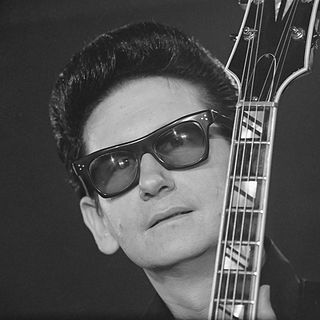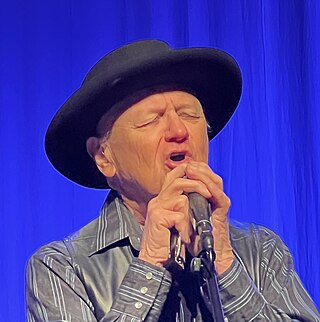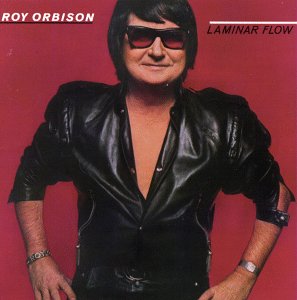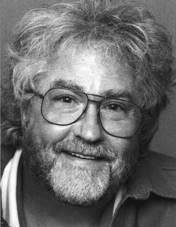
Roy Kelton Orbison was an American singer, songwriter, and guitarist known for his distinctive and powerful voice, complex song structures, and dark, emotional ballads. Orbison's music is mostly in the rock genre and his most successful periods were in the early 1960s and the late 1980s. He was nicknamed "The Caruso of Rock" and "The Big O". Many of Orbison's songs conveyed vulnerability at a time when most male rock-and-roll performers projected machismo. He performed with minimal motion and in black clothes, matching his dyed black hair and dark sunglasses.

Jimmie Dale Gilmore is an American country singer-songwriter currently living in Austin, Texas.
Roy Orbison and Friends: A Black and White Night is a 1988 Cinemax television special originally broadcast on January 3, 1988, presenting a performance by singer/songwriter Roy Orbison and the TCB Band with special guests including Bruce Springsteen, k.d. lang and others. The special was filmed entirely in black and white. After the broadcast, the concert was released on VHS and Laserdisc, and a live album was released in 1989.

Mystery Girl is the twenty-second album by American singer Roy Orbison. It was his last album to be recorded during his lifetime, as he completed the album in November 1988, a month before his death at the age of 52, and it was released posthumously by Virgin Records on January 31, 1989. It includes the hit singles "You Got It", which was co-written by Orbison and his Traveling Wilburys bandmates Jeff Lynne and Tom Petty, and "She's a Mystery to Me", written by Bono and The Edge. The album was a critical and commercial success; it peaked at number 5 on the Billboard 200 in the United States, the highest position Orbison had achieved on that chart, and number 2 on the UK Albums Chart.

Atlanta Rhythm Section is an American Southern rock band formed in 1970 by Rodney Justo (singer), Barry Bailey (guitar), Paul Goddard (bass), Dean Daughtry (keyboards), Robert Nix (drums) and J. R. Cobb (guitar). The band experienced its greatest chart success with Ronnie Hammond as lead singer 1972-1982. Hammond returned again 1988-2001. The band's current lineup consists of Justo, along with guitarists David Anderson and Steve Stone, keyboardist Lee Shealy, bassist Justin Senker and drummer Rodger Stephan.
William Marvin Dees was an American musician known for his songwriting collaborations with singer Roy Orbison.

Charlie McCoy, is an American harmonica virtuoso and multi-instrumentalist in country music. He is best known for his harmonica solos on iconic recordings such as Candy Man, He Stopped Loving Her Today, I Was Country When Country Wasn't Cool, and others. He was a member of the progressive country rock bands Area Code 615 and Barefoot Jerry. After recording with Bob Dylan in New York, McCoy is credited for unknowingly influencing Dylan to decide to come to Nashville to record the critically acclaimed 1966 album "Blonde on Blonde".

Regeneration is an album by the American musician Roy Orbison, released in November 1976. It marked his return to Monument Records, where he had launched his greatest successes more than fifteen years earlier. It was produced by Fred Foster.

Laminar Flow is an album by the American musician Roy Orbison. It was recorded at Wishbone Recording Studio in Muscle Shoals, Alabama, and released in 1979 by Asylum Records. It was the last album of new material Orbison would release in his lifetime. His next studio effort, In Dreams, featured re-recordings of old Orbison hits while Mystery Girl and King of Hearts, his final collections of all-new material, were released posthumously. "Hound Dog Man" is a tribute to Elvis Presley.

"Only the Lonely (Know the Way I Feel)" is a 1960 song written by Roy Orbison and Joe Melson. Orbison's recording of the song, produced by Fred Foster for Monument Records, was the first major hit for the singer. It was described by The New York Times as expressing "a clenched, driven urgency". Released as a 45 rpm single by Monument Records in May 1960, "Only the Lonely" went to No. 2 on the United States Billboard pop music charts on 25 July 1960 (blocked by Brenda Lee's "I'm Sorry") and No. 14 on the Billboard R&B charts. "Only the Lonely" reached number one in the United Kingdom, a position it achieved on 20 October 1960, staying there for two weeks (out of a total of 24 weeks spent on the UK singles chart from 28 July 1960). According to The Authorized Roy Orbison, "Only the Lonely" was the longest charting single of Orbison's career. Personnel on the original recording included Orbison's drummer Larry Parks, plus Nashville A-Team regulars Floyd Cramer on piano, Bob Moore on bass, and Hank Garland and Harold Bradley on guitars, Joe Melson and the Anita Kerr Singers on backing vocals. Drummer Buddy Harman played on the rest of the songs on the session.

Perry Carlton "Buddy" Buie was an American songwriter, producer and publisher. He is most commonly associated with Roy Orbison, the Classics IV and the Atlanta Rhythm Section.

Emory Lee Gordy Jr. is an American musician, songwriter and music producer. A former member of Emmylou Harris' backing band The Hot Band, he is best known for his association with country singer Patty Loveless, to whom he has been married since 1989. Gordy has produced and played bass guitar on nearly all of her albums, in addition to producing albums by Steve Earle, George Jones, and Alabama.

James Barney Cobb Jr. was an American guitarist and songwriter, most notable for co-writing "Spooky", "Stormy" and "Traces", among others, as a member of the Classics IV, plus "Champagne Jam" and "Do It Or Die", among others, as a member of the Atlanta Rhythm Section.

"Oh, Pretty Woman", or simply "Pretty Woman", is a song recorded by Roy Orbison, written by Orbison and Bill Dees. It was released as a single in August 1964 on Monument Records and spent three weeks at number one on the Billboard Hot 100 from September 26, 1964, the second and final single by Orbison (after "Running Scared" to top the US charts. It was also Orbison's third single to top the UK Singles Chart.

Roy Orbison's Sun recordings were made by Orbison at Sun Studio with producer Sam Phillips. Sun Records was established in 1952 in Memphis, Tennessee, and during an eight-year period Phillips recorded such artists as Roy Orbison, B.B. King, Howlin' Wolf, Ike Turner, Rufus Thomas, Elvis Presley, Johnny Cash, Jerry Lee Lewis, Carl Perkins, Harold Jenkins, and Charlie Rich. The musicians signed at Sun Records made music that laid the foundation of rock and roll in the 20th century.
The Candymen were an American pop quintet active 1965–1972 which prefigured the Atlanta Rhythm Section. The group were managed by Dothan, Alabama producer-songwriter Buddy Buie, and included guitarists John Rainey Adkins, plus Barry Bailey and J.R. Cobb, singer Rodney Justo, drummer Robert Nix and keyboard player Dean Daughtry. The band's chart singles included "Georgia Pines" (1967) and "Ways" (1968). They often performed as the backing band of Roy Orbison.

"Pretty Paper" is a song written by country music singer-songwriter Willie Nelson in 1963. After being signed to Monument Records, Nelson played the song for producer Fred Foster. Foster pitched the song to Roy Orbison, who turned it into a hit. Nelson later recorded his own version of the song in November 1964.
The Roy Orbison/The Beatles Tour was a 1963 concert tour of the United Kingdom by Roy Orbison and the Beatles. Other acts on the tour included Gerry and the Pacemakers, David MacBeth, Louise Cordet, Tony Marsh, Terry Young Six, Erkey Grant, and Ian Crawford. It was Orbison's first, and the Beatles' third nationwide tour of the UK. Although Orbison was originally intended to be the headlining act, the reaction to the Beatles on the tour caused them to be promoted to co-headliners, with the Beatles closing the set in the traditional headlining spot.

"Candy Man" is a song by Roy Orbison, released as the B-side to his international hit "Crying" in July 1961. It was later covered by British beat group Brian Poole and the Tremeloes, becoming a top-ten hit in the UK.
John Rainey Adkins was a self-taught guitarist and songwriter from Dothan, Alabama. Adkins experienced commercial success in America during his music career in the 1960s and 1970s with the bands The Candymen and Beaverteeth. Adkins' bands played live on The Ed Sullivan Show, American Bandstand, and NBC's Midnight Special.













